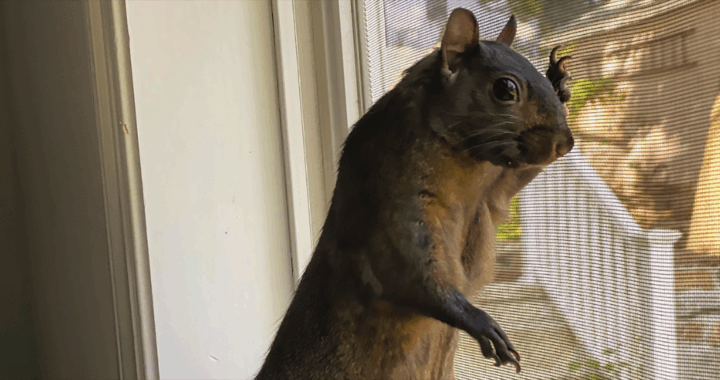Peanut, an eastern gray squirrel rescued in 2017 by Mark Longo, was no ordinary animal. Nursed as a baby and briefly released into the wild, he returned to Longo, forging an extraordinary bond. Over time, Peanut became a beloved companion, a sanctuary symbol, and a viral social media figure with hundreds of thousands of followers worldwide.
From Sanctuary to Courtroom: The Seizure and Death of Internet-Famous Peanut the Squirrel
Background
Longo and his partner, Daniela Bittner, later established P’Nuts Freedom Farm Animal Sanctuary in Pine City, New York. It housed over 300 rescued animals. These included Peanut and a raccoon named Fred. Despite their dedication, they operated without the state licenses required to keep certain wildlife, including squirrels and raccoons, under New York law.
The online fame of Peanut extended beyond heartwarming videos. His Instagram presence reached more than half a million followers, and he played a significant role in drawing attention to the sanctuary. Reports even indicated that Longo leveraged his popularity to generate substantial income through online platforms and related sponsorship activities.
However, beginning in January 2024 and later throughout that year, state agencies received multiple complaints regarding the possession of wild animals in the sanctuary without proper authorization. Officials from the New York Department of Environmental Conservation and the Chemung County Health Department began their investigations.
Faith of Peanut and Fred
Authorities maintained that operating the sanctuary without the legally required licenses created significant public health risks. They argued that wild animals, such as squirrels and raccoons, can harbor dangerous pathogens. Prolonged human contact in an unregulated environment increases the likelihood of animal-to-human or zoonotic disease transmission.
On 30 October 2024, a coordinated team of officers arrived at the sanctuary to seize Peanut the squirrel and Fred the raccoon. Official reports stated that during the removal, Peanut bit a wildlife biologist despite the use of double-layer protective gloves. The incident triggered immediate enforcement of strict public health measures under state rabies control protocols.
Hence, because rabies can only be diagnosed through brain tissue examination after death, officials ordered that both Peanut and Fred be euthanized without delay. The procedure was carried out the same day. Both animals died that day. Subsequent laboratory analysis revealed negative rabies results. This raised controversy over the necessity of swift actions.
Longo and Bittner disputed the necessity and manner of the seizure. They claimed officials entered without a warrant and acted with excessive force while ignoring alternatives like transfers to licensed sanctuaries. The event was framed as an avoidable tragedy fueled by government overreach and a disregard for humane treatment and due process protections.
Aftermath
Public reaction was intense. Social media platforms lit up with outrage. Political commentators cited the case as a striking example of state authority overstepping its bounds. The story also drew global attention, inspiring petitions, fundraising efforts, and even threats directed toward the officials involved in the seizure and subsequent euthanasia of the animals.
State legislators introduced Peanut’s Law in response. This proposed law would require a 72-hour waiting period before euthanizing seized animals to allow owners to seek administrative review. Exceptions would be permitted in situations of immediate public danger. It aimed to prevent irreversible actions without adequate oversight or owner involvement.
Longo and Bittner filed a lawsuit in the Chemung County Supreme Court against local officials. This includes a USD 10 million claim in the New York Court of Claims against the state. Their demands sought compensation for emotional distress, property loss, and financial damages linked to the role of Peanut in helping them generate income from their online activities.
FURTHER READINGS AND REFERENCES
- Lubin, R. 10 August 2025. “New York State Could Owe $10 Million for Internet Famous P’Nut the Squirrel’s Execution.” The Independent. Available online
- Mather, V. and Jimenez, J. 1 November 2024. “After 7 Years, P’Nut the Squirrel Is Taken Away and Then Put Down.” The New York Times. Available online
